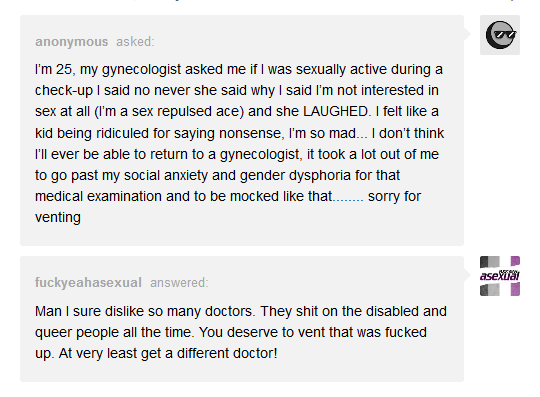○
○
Asexual Bingo 2 is here! TW for vile language, discussion of sexual assault, acephobia, and most -isms.
The first Asexual Bingo:
https://www.youtube.com/watch?v=ncoHJ…
A downloadable Bingo Card for you:
http://juliesondradecker.com/wp-conte…
My book on asexuality, The Invisible Orientation:
http://juliesondradecker.com/?page_id…
○
This is #62 of a series in which I read correspondence between me and people who have questions, comments, or–more often–misconceptions about asexuality. In this one I read some of the shorter comments I’ve had thrown at me by trolls, most of them people who sought out my content just to tell me no one cares about it. OK hun, you do you.
○
today some ace friends and i went to Tokyo Rainbow Pride where we were approached by a smug as fuck acephobic asshat. this video is dedicated to those who do not believe that acephobia and/or asexual erasure are a thing and to those who struggle dealing with people belittling the shit you deal with.
let there be video of acephobia & asexual erasure in action for the world to see.
——————–
※ what is acephobia?
fear, prejudice or discrimination against people within the asexual (ace) spectrum; the belief that asexuality is “unnatural”, “wrong” and/or a health issue that needs “correcting”.
※ what is asexual erasure?
denying the existence of asexuality, asexuals and other sexualities and people within the asexual spectrum; the lack of representation and misrepresentation of the asexual spectrum in the media.
——————-
visit me on Tumblr!
http://queerascat.tumblr.com
○
Va-Va-Bullshit: How Latina ‘Spicy & Sexy’ Stereotypes Affect Asexual Latinas
Excerpts:
«Unsolicited advice from family members who “just don’t get asexuality” is a common occurrence, with Latinas recalling numerous times when they were told they “just haven’t found the right guy,” are immature or are in denial. But ideas about Latina bodies and sexuality also come from outside the family and beyond the Latino community. Greater society, perceiving Latinas as innately hypersexual, remark that asexual Latinas should “stop playing hard to get” and “take the stick out of their butt.” The underlying message in these comments, according to Foster, are always the same: You cannot possibly be anything other than what I say you are, and because I see you, Latina, as a sexual object, I have access to your body in a way that supersedes your autonomy and your right to your own body.»
«But characterizations of Latinas as inherently hypersexual and possessing contemptibly high fertility rates additionally produce another, more insidious form of harm; these myths make it impossible for asexual Latinas to exist in the country’s psyche, obliterating Latinas’ experiences from dominant discourses on asexuality and creating an unnecessary tension for asexual Latinas. Queenie, for instance, has been accused of abandoning her culture and trying to be white because, as a Latina, an identity embedded with notions of sexuality and motherhood, it’s thought that she can’t possibly be really asexual.»
Read the whole article here.
○
“And Now I’m Just Different, but There’s Nothing Actually Wrong With Me”: Asexual Marginalization and Resistance
Excerpts:
«In response to a direct question about whether they had ever felt stigmatized or marginalized as a result of their asexual identity, more than one half of the interviewees answered “yes,” more than one quarter answered “maybe” or “in some ways yes, in some ways no,” and around 20% answered “no.” In addition, all the interviewees described at least one negative experience attributable to compulsory sexuality. Here I offer a typology of these negative impacts of compulsory sexuality: pathologization, isolation, unwanted sex and relationship conflict, and the denial of epistemic authority. It is important to emphasize that what follows should not be taken as direct evidence of marginalization, stigma, or discrimination but as the interviewees’ interpretations of and narratives about particular life experiences.»
«In response to a question about their relationship history, almost two thirds of interviewees reported that social norms about sexuality and relationality and the invisibility of asexuality had negatively affected their interpersonal relationships. Ten interviewees (all female) described engaging in consensual but unwanted sex as a result of social pressure and pressure from a partner.6 Explaining why she had engaged in what she considered consensual but unwanted sex, Marcie, 19, said, “there’s not a lot of visibility for asexuality so when you’re young and you don’t really know that that’s a genuine orientation that you can embrace…you have all of society telling you, ‘You should want to be doing these things….’ So, it tended to get a little sexual but I was always trying to avoid that.” Christine, 21, described the following experience:
The guy I lost my virginity to, I had been in a relationship with him for about a year and I guess I just felt like, well, you know, I need to do this…And everybody was like, ‘Oh, you were raped and that’s awful.’ And like yeah, I guess. I should have said no. I could have said no, but I didn’t. I thought that this is what everybody did in their free time, and so I was trying to be like everybody else.
It is important to note that, according to a substantial body of research, a significant percentage of both women and men report engaging in consensual but unwanted sex for some of the same reasons as those given by the interviewees in this study (e.g., Gavey, 2005; Impett & Peplau, 2002; Muehlenhard & Cook, 1988).7 Thus it is possible that the system of compulsory sexuality negatively affects asexually identified and non–asexually identified people in some of the same ways.»
Read the whole article here.










